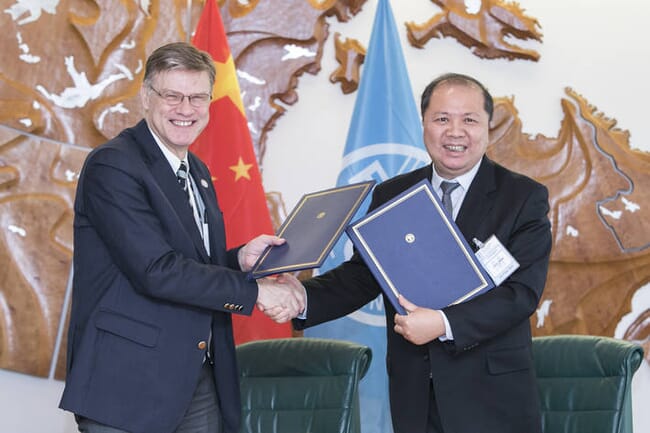
© FAO
The partnership will advance the transfer of technology and capacity development through the South-South Cooperation and promote joint efforts to advance sustainable fisheries and aquaculture management, particularly in the Asia-Pacific region.
"In fisheries and aquaculture China is the biggest in almost everything," said Árni Mathiesen, FAO's assistant director-general for fisheries and aquaculture, at the signing of the agreement with Wang XiaoHu, president of CAFS, at FAO's headquarters in Rome.
"Therefore, it really goes without saying that cooperation with CAFS is a great asset for FAO," Mathieson said.
FAO see their agreement with the Chinese academy, which is affiliated with China's Ministry of Agriculture and Rural Affairs, as a valuable way to help to contribute significantly to improving the lives and livelihoods of communities in developing countries and help them achieve the UN Sustainable Development Goals amid the growing threat of climate change.
Under the accord, FAO and CAFS will facilitate joint seminars and workshops, information exchange and technology transfers. The partners will support initiatives to promote climate impact mitigation and adaption and help build the resilience of fishers and others working in the sector, while strengthening efforts to increase the regulation and safety of fish products for regional and global trade.
This year marks the 10th anniversary of the FAO-China South-South Cooperation Programme (SSC), which has benefited more than 70,000 people directly in 12 developing countries in sub-Saharan Africa and Asia.
Since FAO and China established the SSC Programme in 2009, experts from China have shared their knowledge and technologies with farmers in Africa and Asia to raise agricultural productivity and sustainability in areas including cereal production, animal husbandry, fisheries and aquaculture.
South-South - together with the Triangular Cooperation, which involves third countries and other partners - breaks the traditional dichotomy between donors and recipients and has been effective in creating jobs, building infrastructure and promoting trade.
Through this cooperation, FAO has facilitated exchanges of technical experience and know-how by fielding more than 2,000 experts and technicians to over 80 countries in Africa, Asia, Latin America, North Africa and elsewhere over the past 20 years.

